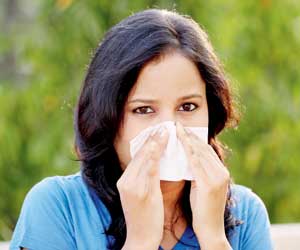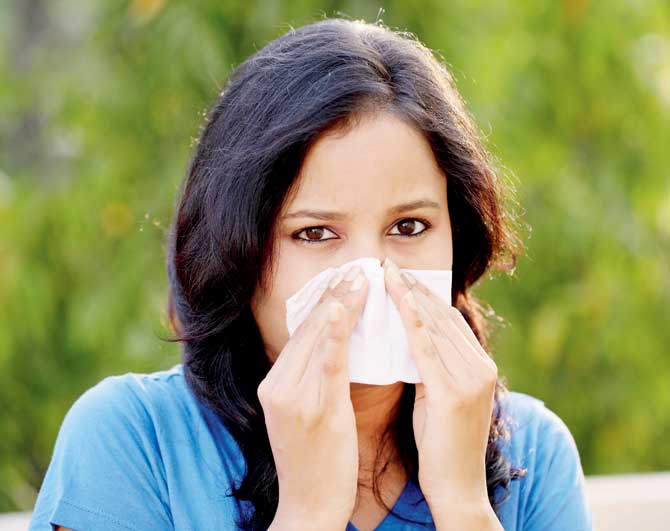Doctors warn that allergies are at an all-time high, particularly among the working population; experts caution patients to consult a specialist and not ignore the symptoms

Find yourself sneezing all the time these days? You're not he only one. Doctors in the city are concerned about the rapid increase in patients complaining of hay fever (allergic rhinitis), dry cough, irritation in throat, and other allergic symptoms.
ADVERTISEMENT

Representation pic/Thinkstock
Apart from worsening pollution, experts blame the allergy outbreak on air-conditioned offices, which expose citizens to poor air quality and fluctuating day and night temperatures. This theory seems all the more likely considering the fact that allergies have suddenly become more prevalent in the 20-45 age group – the working population. The issue has also affected children and senior citizens.
The doctor nose best
Dr Arvind Kate, a pulmonologist from Chembur, said, "There is an increase in cases of patients with allergic rhinitis, cough and other upper or lower respiratory tract infections, as compared to past years. One of the reasons is the seasonal variation. In the weeks before Diwali, we witnessed unseasonal rainfall in the evening hours, and now, with a change in seasons, there is already a dip in temperatures, especially early morning and late night. This is an apt time for viruses to mushroom, leaving people more prone to infections as well." Dr Kate advised that high-risk patients with a history of bronchitis, asthma, high blood pressure and heart ailments should take flu vaccinations every year to prevent any virus attack.
Don't take it sneezy
He further recommended that patients suffering from allergies should get their ACs serviced and cleaned to ensure that they are not breathing in trapped dust and germs. Stale water in room coolers and dampness in walls can also lead to respiratory tract issues, due to fungal growth.
Dr Rohan Sequeira, consulting physician with Jaslok hospital said, "Allergies affect about 10-25% of the population, making it one of the top ten reasons for visiting a physician. Though it often adversely affects the quality of life, in India, allergic rhinitis is often regarded as a trivial disease, and patients fail to take it seriously."
"In India, 20-30% of the population suffers from allergic rhinitis or other allergic diseases. Common allergens are pollens, dust mites, pets and mould. Allergic rhinitis is associated with number of co-morbid conditions such as asthma, sinusitis, otitis media (OM), atopic dermatitis, conjunctivitis and nasal polyps."
Dr Wiqar Shaikh, allergy specialist and professor of Medicine at Grant Medical college and JJ Group of hospitals, said, "Approximately 30% of the Indian population - unlike 50% of the population in Western countries - are allergic to dust, clothes, pets, foods and pollen, etc. Studies have revealed that allergy is primarily a hereditary disease."
Dr Shaikh added a word of caution for patients to not go for over-the-counter medication. Nor should they rely solely on home remedies and delay getting medical treatment for the root cause of the allergy, as this may lead to other serious problems like asthma and respiratory infections.
 Subscribe today by clicking the link and stay updated with the latest news!" Click here!
Subscribe today by clicking the link and stay updated with the latest news!" Click here!






